Top10VPN is editorially independent. We may earn commissions if you buy a VPN via our links.
What Is Double VPN (Multi-hop)?
Our Verdict
Double VPN (multi-hop) is a security feature which routes your traffic through two different VPN servers instead of one. This strengthens your internet privacy and security, but it does slow down your connection speed. Despite the benefits of Double VPN, a normal VPN connection is faster, more reliable, and provides an adequate level of security.

Double VPN, also known as multi-hop, is an advanced security feature offered by certain VPN services. When you connect to a VPN normally, your web traffic travels from your device to the VPN server and then to its destination. By enabling Double VPN, a second VPN server is added to the flow of traffic, encrypting your data twice.
Double VPN is great for protecting sensitive data and concealing your IP address online. However, adding a second server introduces its own challenges, including reducing your connection speeds.
EXPERT ADVICE: Based on our tests, the VPN with the best Double VPN feature is NordVPN. It provides double encryption servers that are easy to connect to, fast, and excellent for privacy.
Why Trust Us?
We’re fully independent and have been reviewing VPNs since 2016. Our advice is based on our own testing results and is unaffected by financial incentives. Learn who we are and how we test VPNs.
How Does Double VPN Work?
Double VPN is an advanced feature of some VPN services that routes or ‘chains’ your traffic through two VPN servers instead of one. However, it is not always implemented in the same way.
For example, NordVPN’s Double VPN feature adds two layers of encryption. The first layer of encryption is applied at your computer or smartphone, and the second is added at the first VPN server.
Re-encryption is not a necessary requirement for Double VPN, but it’s a welcome layer of additional security which compensates for the slow speeds that many Double VPN setups experience.
Other VPN services like Private Internet Access use both a VPN and a proxy in their Double VPN configuration. Your traffic is still routed through two servers, but it lacks the double encryption of its competitors.
Here’s a diagram outlining the data flow of a simple double VPN configuration:

Your data is encrypted twice before reaching the internet.
Here’s what happens when you use Double VPN:
- Once you’ve selected a Double VPN server of your choice, you can navigate to a website in your browser.
- The VPN Client on your device encrypts your connection request, hiding it from your internet service provider (ISP).
- The encrypted data is then sent to the first VPN server, where one of two things can happen:
- The server adds an additional layer of encryption before passing your data along.
- The VPN server processes your data and forwards it along to the next server.
- Your connection data arrives at the second VPN server, which only knows the IP address of the first VPN server. Its encryption (single or double layer) is removed.
- The second VPN server communicates with the destination website on your behalf, which only registers the IP address of the second server.
- The process then continues in reverse until the website information appears, decrypted, in your browser.
Is Double VPN Actually Worth Using?
| Pros | Cons |
|---|---|
| Two layers of encryption | Limited server choice |
| Double VPN servers cover multiple countries, makes it harder to identify your real location | Too slow to be used with Tor |
| Increased protection against traffic correlation attacks | Much slower connection speeds |
| Your real IP address is replaced twice | Double VPN is generally only offered by premium VPN services |
| You may only connect to one VPN server or fail to make a connection whatsoever |
QUICK SUMMARY:
Double VPN decentralizes your data and encrypts it twice, which means it is worth using if you’re sending sensitive information and you’re not overly-concerned with choosing a server location.
However, it will be expensive and your connection speeds will likely be too slow for torrenting and gaming. Streaming can be possible but it depends on the strength of your connection and the VPN you use.
A normal VPN connection is faster, more reliable, offers a wider server network, and can also encrypt your data. We only recommend Double VPN if you want to maximize your online privacy and security, especially against traffic correlation attacks.
Double VPN is far more secure than a normal VPN connection.
When using an ordinary VPN all of your traffic is routed through a single VPN server. Your incoming and outgoing traffic from this server could be monitored and used to expose your identity.
In contrast, Double VPN ensures a separation of personal data by splitting the content of your traffic between two VPN servers in different locations.
The first VPN server processes your originating IP address, but it does not communicate with your destination website. Conversely, the second VPN server communicates with the webserver on your behalf but does not have access to your original IP address.
This adds an additional layer of privacy and security, as both VPN servers would need to be monitored to identify your activity. Moreover, Double VPN effectively replaces your IP address twice, making it even harder to identify your real geographical location.
Here’s a summary of how Double VPN processes your personal data:
- Your data, including your public IP address, is sent to the first VPN server. The VPN server assigns a new IP address and forwards your traffic to the next server.
- The second VPN server receives your encrypted traffic and its new IP address. It cannot see your original IP address as it was replaced by the first VPN server.
- Your traffic is decrypted, assigned another new IP address, which belongs to the second VPN server, and sent to its destination website.
- The website receives your decrypted data and can only see the IP address of the second VPN server.
Introducing a second VPN server does, however, come at the cost of higher subscription fees and slower connection speeds.
Double VPN is an advanced feature that is only offered by premium, subscription-based VPN services. There are currently no free VPN services that natively support Double VPN. Even if there were, it is unlikely a free VPN service would have the necessary connection speeds to sustain multiple server hops.
In addition, VPN services usually limit Double VPN functionality to a handful of servers – typically in the US and Europe. If you’re looking to connect to a Double VPN server in a location outside of these regions, you can expect your connection speeds to be even slower.
When Should You Use Double VPN?
Double VPN is more secure than an ordinary VPN connection, but it’s not always the best option for casual VPN users.
Here’s a summary of when to use Double VPN:
- To bypass website restrictions in highly-censored countries
- To protect your data against advanced cyberattacks
We recommend enabling Double VPN in the following circumstances:
1To Bypass Government Censorship
Large-scale attempts at web censorship, such as China’s Great Firewall, involve blocking or restricting connections to specific foreign websites.
Double VPN can bypass this censorship by initially routing your traffic through a VPN server in an accessible country, then transferring your request to a second VPN server in a blocked country.
For example, if you’re in China and want to access an American website, you can use Double VPN to connect to Singapore, then connect to a second server in the US. The Government censors in China will only be able to see your connection to a Singaporean server and will not detect an American IP address.
A VPN might also have other obfuscation features that can bypass online censorship, such as Shadowsocks and Obfsproxy.
2To Protect Sensitive Data from Advanced Attacks
Normal VPN connections can be susceptible to traffic correlation attacks. This is when an attacker attempts to de-anonymize data by finding patterns in both ends of the communication channel.
By passing your data through two servers in two different locations, Double VPN can obscure one end of the communication channel and protect you against these attacks.
Even if your first server was compromised, your data’s endpoint would be hidden behind the second VPN server.
EXPERT ADVICE: An individual or institution with sufficient jurisdiction in the locations of both the first and second VPN server could still, in theory, successfully carry out a traffic correlation attack. This is an extreme example, though.
When Shouldn’t You Use Double VPN?
Using a VPN will almost always slow your connection speeds because your data has to travel further. This problem is amplified when you involve a second VPN server in the routing.
For this reason, there are some circumstances that will not benefit from an additional layer of protection. Here’s a summary of when not to use Double VPN:
- When streaming region-restricted content e.g. on Netflix
- When gaming or running other high-bandwidth applications
- When torrenting large files or other P2P-based activities
We recommend avoiding Double VPN in the following circumstances:
1Streaming Region-Restricted Content
You shouldn’t rely on Double VPN to access geo-restricted content like US Netflix, Disney+, or BBC iPlayer.
Fast connection speeds are essential for smooth streaming. Using Double VPN routes your traffic through multiple servers before finally connecting to the streaming site, which will increase your latency and cause the stream to buffer.
It’s also much harder to find Double VPN servers in a wide range of locations. Server coverage is essential for streaming, as connecting to a server in a different country allows you to unlock content exclusive to that region
If you want to access geo-restricted content regularly, try out a reliable VPN for streaming.
2Online Gaming
Online gaming requires fast connection speeds to matchmake, avoid lag, and maintain connection to a server or opponent.
Even the best gaming VPNs increase your ping which, in turn, causes your game to lag. Double VPN routes your traffic to a second server, raising your ping even higher.
One of our fastest Double VPNs, Surfshark, failed to connect to the online game server in our testing. In the image below, we registered a ping in the excess of 100ms when attempting a connection.
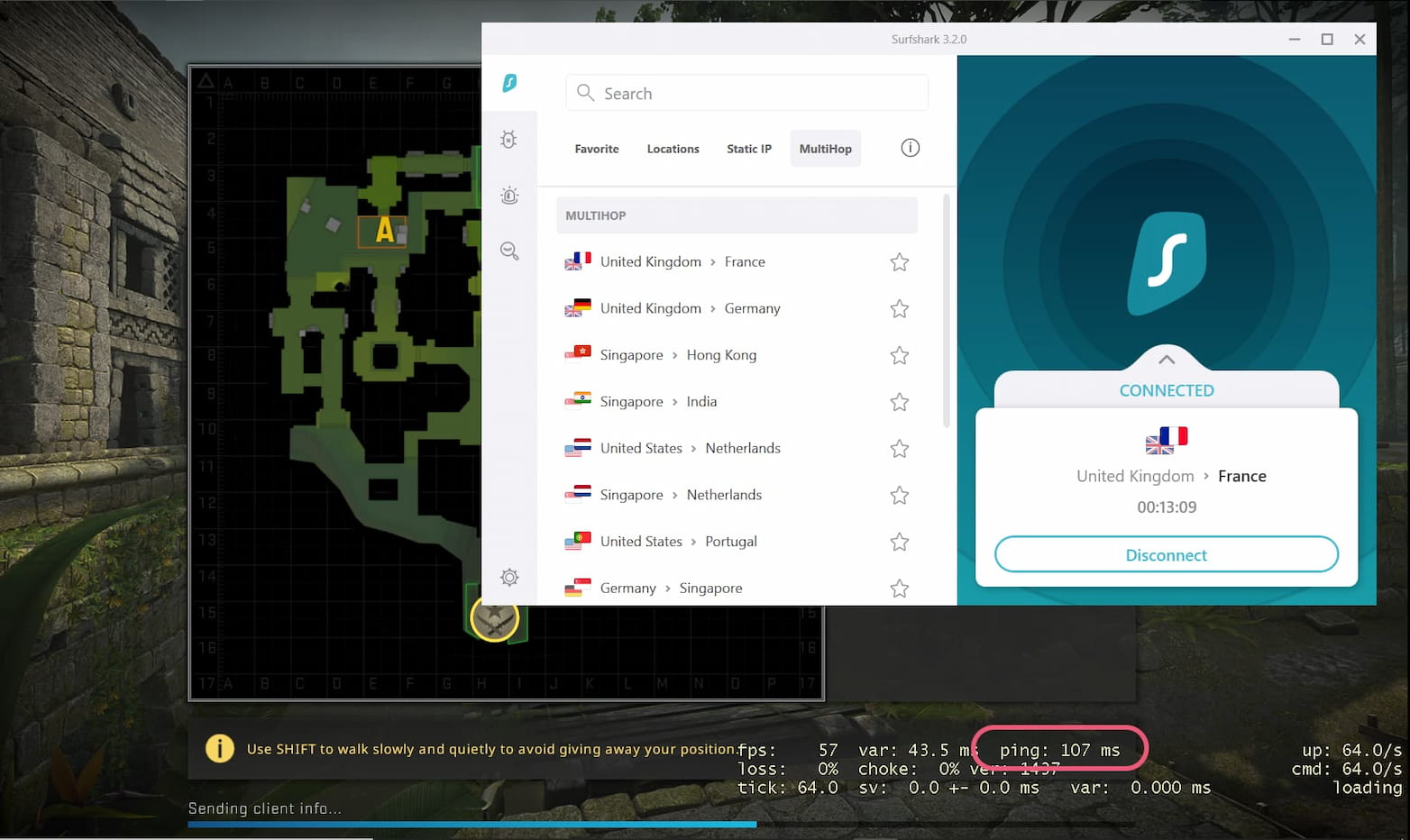
We were unable to get past the loading screen with Double VPN enabled.
Double VPN’s limited server coverage may force you to matchmake in a region far away from your real location. This would further worsen your lag, potentially causing you to disconnect from your game entirely.
3Torrenting & P2P Activity
Double VPN routes your traffic through two VPN servers before accessing the torrenting swarm. This significantly reduces both your download and upload speed which are essential for torrenting larger files.
We tried torrenting with NordVPN’s multi-hop feature and recorded an average bitrate of 5.5 MiB/s. This is a 44% decrease from NordVPN’s standard bitrate of 9.8MiB/s.
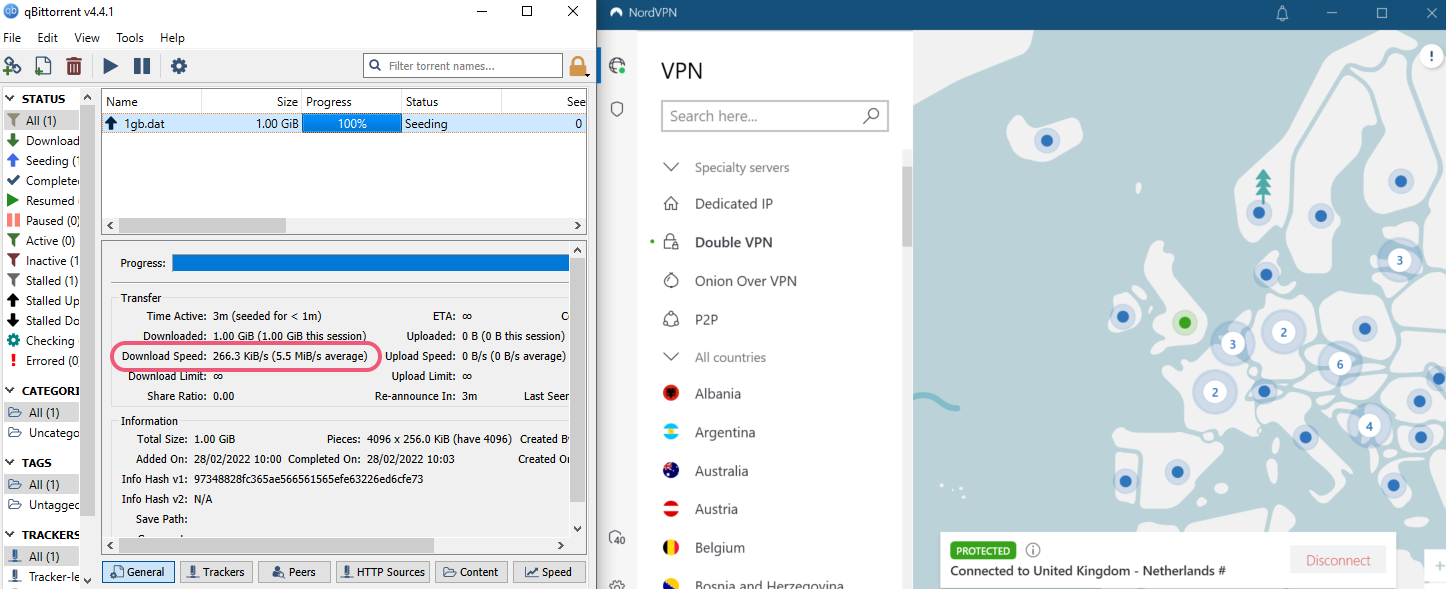
NordVPN’s Double VPN greatly reduced our download speed.
It’s not impossible to torrent on NordVPN’s Double VPN feature but there are faster alternatives available.
It is also unlikely that both of your VPN servers are optimized for P2P traffic and configured in a way to allow these types of connections.
A top torrenting VPN can conceal your IP address from the torrent swarm, encrypt your P2P traffic, and hide your torrenting activity from your ISP without sacrificing your torrenting speeds.
How to Set Up and Use Double VPN
Here’s a video demonstrating how to use Double VPN. We’ve used NordVPN’s app as an example:

We were able to connect immediately to NordVPN's multi-hop servers.
EXPERT ADVICE: The setup for Double VPN will vary depending on the VPN service. Some providers may refer to it as ‘Multi-hop VPN.’
Here’s how to enable Double VPN on NordVPN:
- Download and install the NordVPN app on your device.
- Go to the server list and locate Double VPN under the Speciality Servers tab.
- On Windows, click the three dots next to Double VPN and select your desired starting country and its corresponding Double VPN server. Then click connect.
On macOS, click the three dots next to Double VPN and then click the tab Servers. Choose a Double VPN server from this list. You will connect automatically.
- Alternatively, you can double click on Double VPN in the Speciality Servers tab to auto-connect to your nearest location
What's the Difference Between Double VPN and VPN over VPN?
VPN over VPN (also known as VPN chaining) is when you run two or more VPN connections simultaneously. Whereas Double VPN uses two VPN servers from the same provider, VPN over VPN uses VPN servers from two different providers and requires manual setup.
In theory, you can ‘chain’ together as many VPNs as you want in a VPN over VPN setup as long as your bandwidth can handle it. There aren’t any VPN services on the market that offer this level of collaboration with a competitor, so you will need to manually configure the two VPNs yourself.
Double VPN and VPN over VPN are similar, but with a few important differences:
| Double VPN | VPN over VPN | |
|---|---|---|
| Setup Difficulty | Easy setup that can be done within the VPN app settings on a single device | Complicated setup requiring technical knowledge and two active devices |
| Encryption | Strength and duration of encryption vary by provider | Guaranteed double encryption for the entire process |
| Server Choice | Server coverage is often limited to a select few regions | You have access to the full server lists of both providers |
| # of Server Hops | Limited to two VPN servers | Limited to as many servers as your bandwidth can handle |
| Cost | Only requires subscription to one VPN service | Requires multiple VPN subscriptions |
| VPN Choice | VPN provider choice is restricted to only those that can support Double VPN | Any VPN of your choice can be used |
| Privacy | All of your personal data is given to one provider | Your personal data is split between two providers, protecting your anonymity if one of the servers are compromised |
| Speed | Double VPN generally has slow connection speeds | VPN over VPN generally has slow connection speeds |
The key difference between the two setups is the level of encryption offered. Whether Double VPN offers single or double encryption is down to the limitations of the VPN service.
Double VPNs that offer double encryption add the second layer of encryption at the first VPN server, which means your data only has a single layer of encryption between the starting device and the initial VPN server.
VPN over VPN always guarantees double encryption for your data as the two VPNs will offer a standard layer of encryption each. Furthermore, the encryption process will take place before reaching the first VPN server.
We recommend a VPN over VPN setup if you’re looking to maximize your online security – but only if this is an absolute necessity. A single layer of encryption on a Double VPN configuration will still keep you secure online with a much easier setup process.
When to use VPN over VPN
- If your preferred VPN service doesn’t offer Double VPN. Double VPN is only supported by a handful of VPN providers. VPN over VPN allows you to create your own Double VPN setup with the VPN providers of your choice.
- If you want to protect sensitive data. VPN over VPN divides your data between two providers, splitting the risk. Furthermore, your web traffic is double encrypted throughout the entire process.
- If you want to route your traffic through more than two VPN servers. VPN over VPN setups are not limited to two servers. The number of VPNs you can include is only dependent on your bandwidth and their compatibility with each other.

VPN over VPN will always encrypt your traffic twice.
We recommend the following VPN-over-VPN configurations:
- Install one VPN provider on your personal device (a laptop, smartphone, or TV) and a second VPN on your router.
- Install one VPN on your PC and a second VPN on a virtual machine within that PC.
EXPERT ADVICE: If you opt for the second configuration, make sure any browsing or internet activity is carried out on the virtual machine.
How does Double VPN Differ From Onion over VPN?
Double VPN and Onion over VPN both protect your personal data by routing your traffic through multiple, secure ‘hops’ – whether that’s servers, nodes, or a combination of the two. This invites comparisons to be made, but there are major differences between the two setups:
| Double VPN | Tor over VPN | |
|---|---|---|
| Setup Difficulty | Easy setup that can be done within the VPN app settings on a single device | Complex setup that requires a compatible VPN and knowledge of the Tor browser |
| Encryption | Strength and duration of encryption vary by provider | Onion over VPN will encrypt your data four times |
| Server Choice | Server coverage is often limited to a select few regions | The location of Tor nodes are anonymous and randomized |
| # of Server Hops | Limited to two VPN servers | Tor over VPN is always a VPN startpoint and three nodes |
| Cost | Only requires subscription to one VPN service | Only requires subscription to one VPN service |
| VPN Choice | VPN provider choice is restricted to only those that can support Double VPN | Any VPN of your choice can be used |
| Privacy | All of your personal data is given to one provider | Your personal data is divided between two types of software |
| Speed | Double VPN generally has slow connection speeds | Tor over VPN generally has slow connection speeds |

How onion over VPN works.
Structurally, Double VPN uses the same type of software twice, whereas Tor over VPN utilises two different types of software.
This means Double VPN is far easier to set up but it concentrates your risk. However, if your VPN server is seized in a Tor over VPN setup, you can rely on the Tor nodes to keep your data secure.
Having said that, Tor over VPN is not without its security flaws.
Double VPN has greater versatility, supporting both the UDP and TCP security protocols. Whereas, Tor over VPN is only compatible with the much slower TCP protocol.
We recommend using Tor over VPN only if anonymity is an absolute priority for you. You can still maintain a high level of privacy and security using Double VPN with a much simpler setup.
The 3 Best VPNs with a Double VPN (Multi-Hop) Feature
Only a few VPN services offer Double VPN. The best VPNs for Double VPN don’t only support the feature, but will also maintain fast connection speeds while you’re using it.
We’ve assessed the top VPN services based on how many Double VPN servers they offer, their average download speed when making a multi-hop connection, and their logging policy.
All of our recommended VPNs come equipped with a reliable VPN kill switch, ensuring your data is safe if the multi-hop connection fails.
Here’s a table comparing the top VPNs for Double VPN based on these testing parameters:
1. NordVPN: The Best Double VPN Feature
Ranked #1 out of 62 Multi-hop VPNs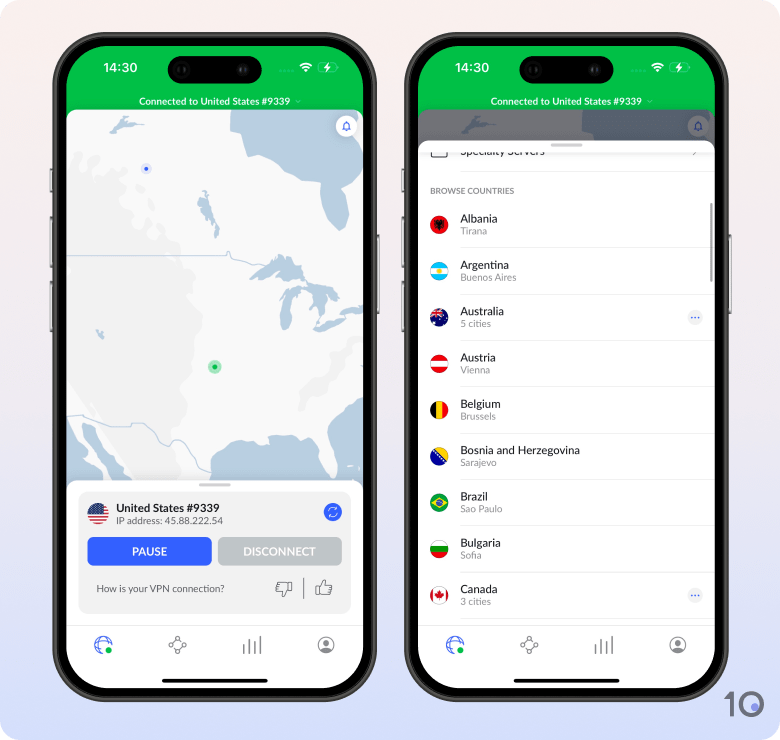
Our tests confirm that NordVPN has the best Double VPN feature. NordVPN is a great VPN, both all-round and for its Double VPN functionality.
NordVPN’s proprietary WireGuard protocol, NordLynx, outputs some of the fastest speeds we’ve tested.
UPDATE As of July 2022, NordVPN’s Double VPN servers work with the NordLynx and IKEv2 protocols.
Our nearby multi-hop connections were over twice as fast on the WireGuard protocol when compared to our previous OpenVPN speeds.
Double Encryption & Private Logging Policy
NordVPN provides double encryption on all of its Double VPN servers. This isn’t a necessary feature but it provides a further layer of protection and anonymity.
Its minimal logging policy has been backed by multiple audits, the most recent by Deloitte at the end of 2023. Furthermore, NordVPN operates under the jurisdiction of Panama which is considered to be a privacy haven exempt from intrusive data laws.
Double VPN is an advanced security feature but it is only as secure as the company operating it. NordVPN’s excellent logging policy, jurisdiction, and double encryption makes it an ideal option if you’re looking to maximize your security and privacy.
Limited Multi-Hop Server Network
Its Double VPN server network is limited to locations in the US, Canada, and Western Europe. There are no servers in Africa, and Asia is represented by a single server from Hong Kong to Taiwan.
However, NordVPN recorded a respectable average speed loss of 12% when connecting to distant Double VPN servers which should help mitigate the restricted server coverage.
There is a degree of flexibility within its server network. Each location has multiple Double VPN servers to choose from as well as the option to switch the startpoint and endpoint locations around.
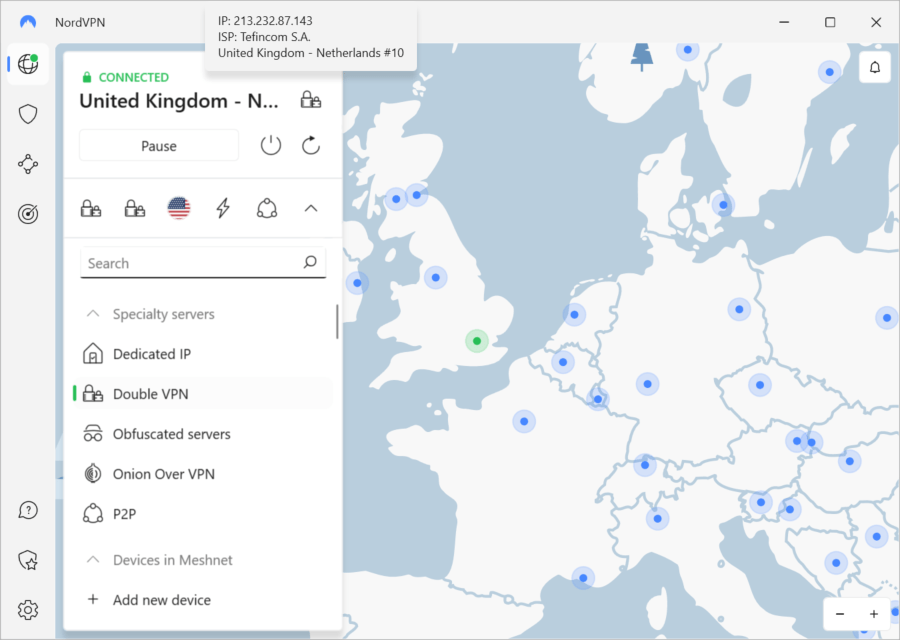
NordVPN only allows short-distance Multi-hop connections.
Unusually, NordVPN does not allow long-distance Double VPN configuration. If you connect to a Double VPN server your traffic will only ever be directed to a neighboring country.
2. Surfshark: Best Budget Double VPN
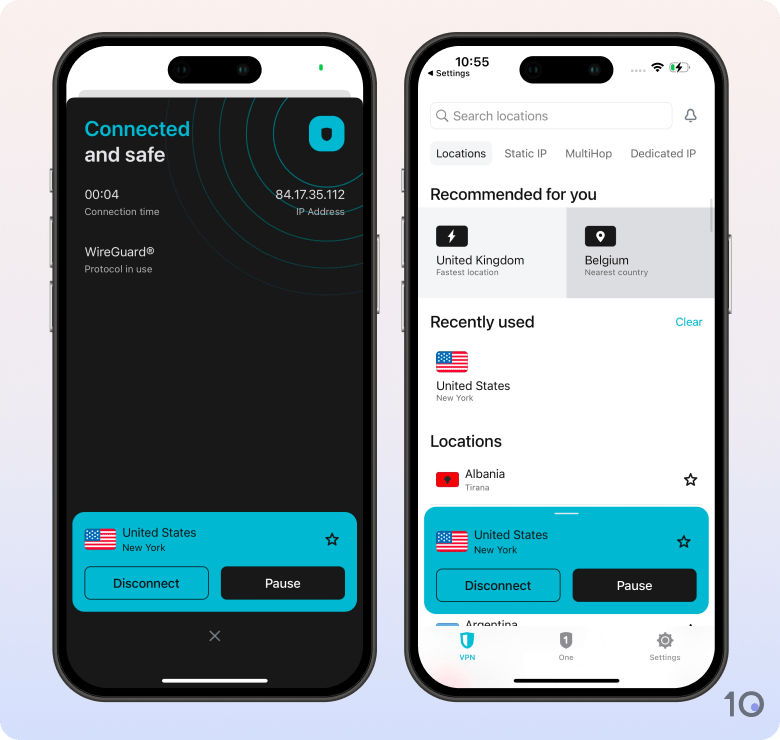
Surfshark is one of the best VPNs we’ve reviewed and its Double VPN feature is a great choice for fast speeds and affordability.
Its Double VPN feature encrypts your data twice using the AES-256 cipher, completely nullifying brute force and traffic correlation attacks.
It does not collect any identifying data and it matched NordVPN’s speeds, with almost zero speed loss on nearby servers.
Affordable but Smaller Server Network than Rivals
Surfshark VPN is more affordable than its competitors, only costing $2.29 over a period of 27 months.
The only drawback is Surfshark’s poor server coverage. Only 14 servers are available and every Double VPN endpoint is located in Western Europe or the US. Asia is only represented by startpoint servers in India and Singapore and no servers whatsoever are located in Africa.
If you’re looking to connect to a Double VPN outside of Western Europe or the US then you are better off using Proton VPN.
3. Extensive Double VPN Server Coverage
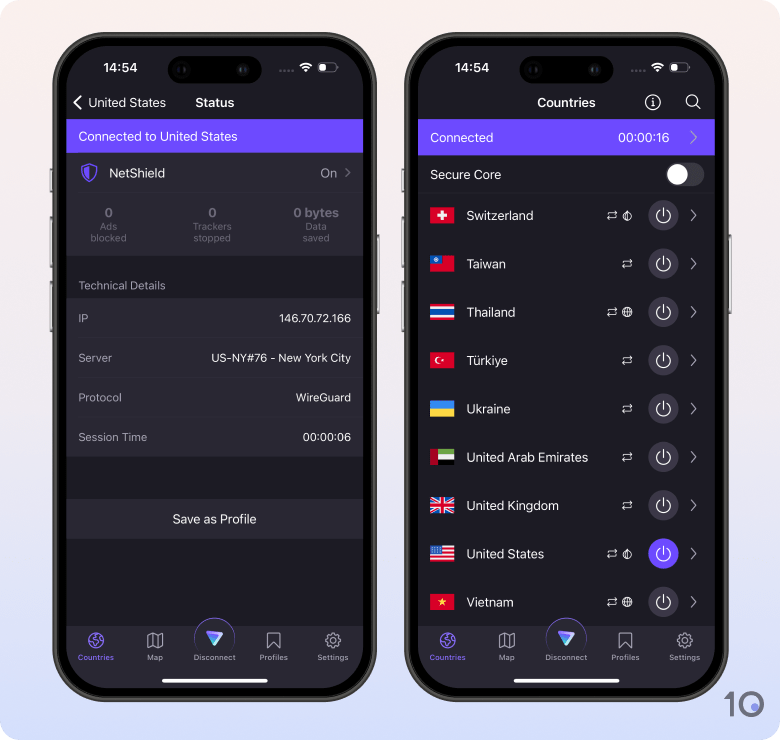
Proton VPN is one of the few VPN services to offer WireGuard compatibility with Double VPN servers. WireGuard is a relatively new VPN protocol that specializes in providing extremely fast speeds with maximum security.
Fast Multi-Hop Speeds with WireGuard
Proton VPN’s Double VPN servers use WireGuard to its full effect, with its short distance servers recording an impressive average speed of 92Mbps. We rarely see a speed decrease of more than 1% on Proton VPN’s shorter distance servers, and its upload speeds follow a similar trend.
At longer distances Proton VPN maintained a respectable average speed of 60Mbps, but with a higher ping rate.
Excellent Double VPN Server Coverage
With 60 different server locations and 96 servers, Proton VPN has the best Double VPN server coverage out of any VPN service we have tested. Proton VPN routes your traffic through one of its ‘Secure Core servers’ in either Switzerland, Iceland, or Sweden and then sends it to your desired location.
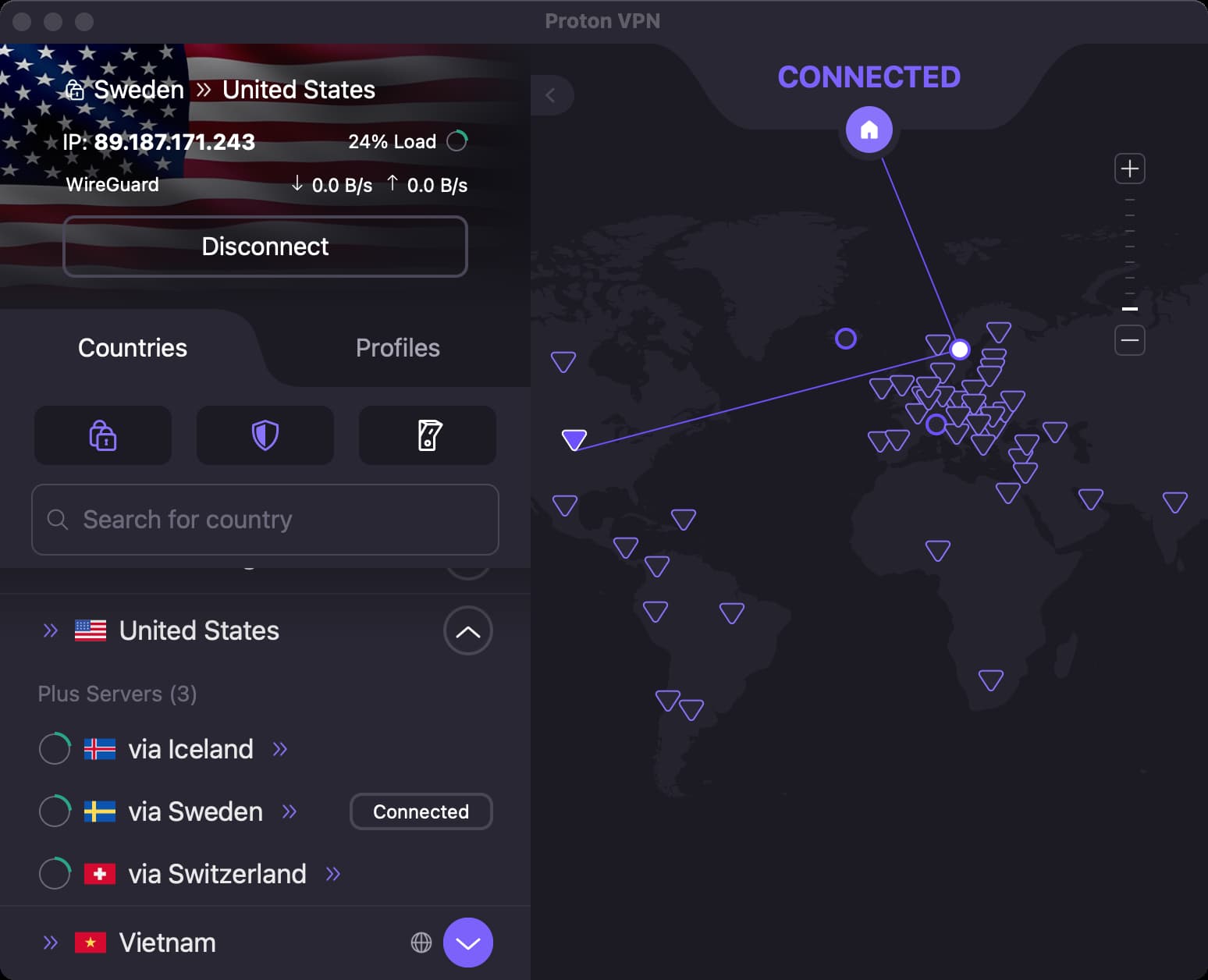
Proton VPN offers multi-hop servers in over 60 different locations.
Proton VPN’s extensive server coverage mitigates its mediocre long-distance speeds as it’s unlikely you’ll be located too far away from a Double VPN server.


